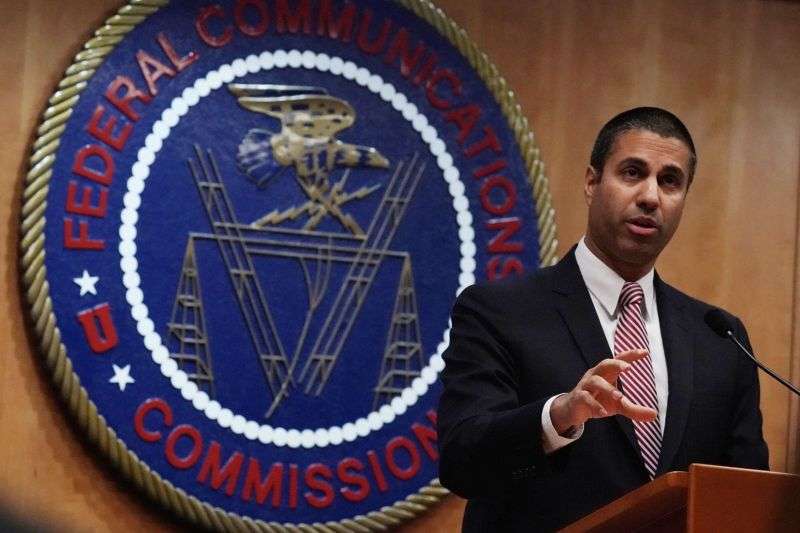
Pai’s FCC orders cities and towns to stop regulating cable broadband

The Federal Communications Commission today ordered cities and towns across the country to stop regulating broadband delivered over cable networks.
The vote to approve Chairman Ajit Pai’s plan also limits the fees that municipalities can charge cable companies. This could impact public TV stations and services that network operators provide cities and towns in exchange for cable TV franchises.
The FCC announcement of its decision said, “the Order prohibits excessive franchise fees and explains that local governments may not regulate most non-cable services, including broadband Internet access service, offered over a cable system.” The FCC claimed that its decision “remove[s] obstacles to the deployment of broadband.”
Cities and towns object
Many cities and towns had written to the FCC urging it to scrap the plan.
“We’ve heard from thousands of communities across the country worried we are cutting the operations of so many local channels,” FCC Commissioner Jessica Rosenworcel, a Democrat, said while voting against Pai’s plan. “I am saddened that this agency refuses to listen.”
The FCC’s Republican majority “insist[s] that funding these local stations and related efforts damages the ability of our nation’s broadband providers to extend their networks to communities without high-speed service,” Rosenworcel said. But ISPs haven’t actually promised to deploy more broadband in exchange for the regulatory favor from the FCC, she said.
“Comb through the text of this decision,” Rosenworcel said. “You will not find a single commitment made to providing more broadband service in remote communities. There is no enforceable obligation to expand broadband capacity. There is no agreement that any savings from today’s action is pushed into new network deployment. I fear this absence speaks volumes.”
Pai’s FCC has repeatedly claimed the authority to preempt local regulation of broadband despite the FCC abandoning its own Title II authority to regulate broadband.
Today’s vote “is consistent with the commission’s current perplexing view that it has no statutory authority over broadband but can nevertheless preempt states and local authorities from exercising their own authority,” said John Bergmayer, legal director of consumer advocacy group Public Knowledge.
The FCC is likely to face a lawsuit over today’s decision. Bergmayer predicted that the FCC order will be overturned.
“In this case the commission has decided to pursue a theory that an obscure provision of Title VI of the Communications Act gives it broad powers to substitute its views for those of local governments that are closer to the people they serve,” he said. “We’re confident that this unreasonable exercise in statutory gymnastics will eventually be rejected.” The FCC decision “contradicts numerous federal and state courts that have read the statute and found it contains no such broad preemption authority,” Bergmayer also said.
Comcast case helped spur FCC action
Pai’s proposal complained that “some states and localities are purporting to assert authority” to collect fees and impose requirements that aren’t explicitly allowed by Title VI, the cable-regulation section that Congress added to communications law with the Cable Act of 1984.
US cable law prevents local authorities from collecting more than 5% of a cable operator’s gross revenue in any 12-month period. In today’s announcement, Pai’s office said some local governments have been requiring in-kind contributions from cable operators to get around the 5% cap and that the FCC preemption will “rein in [this] overreach by local franchising authorities.” The FCC order says that most in-kind contributions must count toward the 5% cap.
The FCC action was spurred partly by an Oregon state Supreme Court decision that upheld a 7% “telecommunications” license fee the city of Eugene imposed on Comcast. The FCC’s Republican majority says the court got the law wrong.
Republican FCC Commissioner Michael O’Rielly said:
Inappropriate court determinations, such as the Eugene, Oregon, franchise case have wrongly tried to open the door to the imposition of such fees on other services offered by what have traditionally been called cable operators… However, the statute is quite clear on the matter and the item appropriately clarifies that franchise authorities can only regulate cable services. Today’s action closes off potential revenues for franchise authorities from non-cable services, which is the right statutory reading.
“Grave harm to local communities”
The FCC vote was 3-2, with dissents from Rosenworcel and Geoffrey Starks, the FCC’s other Democrat.
Starks said:
Thousands of federal, state, and local leaders have submitted substantive comments in our docket, pointing out how our action today will… target certain terms negotiated into franchise agreements that are of great importance to local communities. From free or discounted services to schools or government buildings, to institutional networks, or I-Nets, which are viewed as critical infrastructure by many cities and relied upon to support government functions and public safety communications, much is at stake.
Public, educational, and governmental (PEG) channels that are funded by franchise agreements will also take a hit, he said. “Free or discounted service to cash-strapped schools, provision of critical I-Nets, discounts to vulnerable communities—all of these franchise terms advance the public interest and are a small imposition given the value received by providers in franchise negotiations,” Starks said. “Our action today is unnecessary, unsupported by law or precedent, and risks causing grave harm to local communities.”
Pai defended the order by saying that fees charged by local authorities get passed on to consumers by cable companies. He said:
Every dollar paid in excessive fees is by definition a dollar that cannot and will not be invested in upgrading and expanding networks… This discourages the deployment of new services, like faster home broadband or better Wi-Fi or Internet-of-things networks. By simply insisting that LFAs [local franchising authorities] comply with the law, we will reduce costs for consumers and expedite the deployment of next-generation services.




